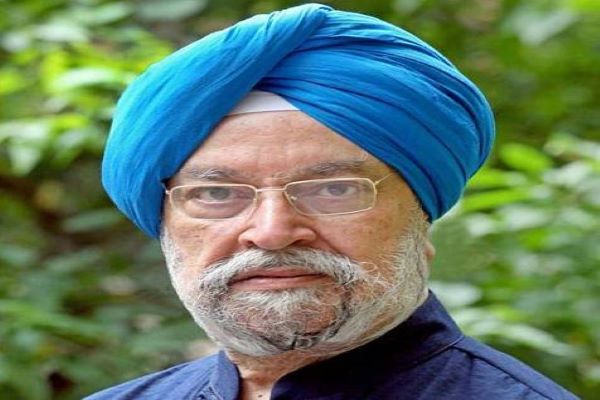India has already seen the average cost of PNG go down by about 10% whereas there has been a 6-7% reduction in CNG prices

Hardeep S Puri, Minister of Petroleum & Natural Gas, and Housing & Urban Affairs, stated that India has successfully been able to modulate the effective price to consumer, thus insulating the common man from price rise and volatility in international prices.
He said that while nations in our neighborhood and perhaps even developed countries might have struggled with energy rationing, pump dry-outs and spiraling fuel prices, among other concerns, India’s policy successfully ensured a sustained availability of fuel. This has led to the lowest price inflation in the world.
Puri was speaking at a session titled ‘Powering Amrit Kaal Through Energy Transition’ last evening at the CII Annual Session 2023 which had the theme ‘Future Frontiers: Competitiveness, Technology, Sustainability, Internationalization’.
Puri highlighted that there was a need to ensure stable, secure and affordable energy supplies as India continues on its fast trajectory of growth towards a USD 5-trillion economy and then to a USD 10-trillion economy. He stated that reforms in the energy sector in general, and the oil and gas sector in particular, demonstrate India’s commitment to energy security, ease of doing business, and energy transition.
Recently, in a major policy reform which gave fresh impetus to the gas sector, the Cabinet approved a series of critical gas pricing reforms. In the absence of these decisions, he stated that gas prices would have been uncompetitive to alternative fuels and hindered the expansion of the gas-based economy. The prices of gas for priority consumers would have increased by about 10% in the next half-year and continued to rise in the subsequent periods, the Minister further said.
Now, the Administered Price Mechanism (APM) prices will be determined monthly at 10% of the average Indian Crude Basket Prices, with a ceiling (US $6.5/MMBTU) and floor (US $4/MMBTU). The ceiling will remain the same for the first two years and then increase by US $0.25/MMBTU every year, to adjust for any cost inflation.
He added that the general public has already started reaping the benefits of this decision. India has already seen the average cost of PNG go down by about 10% whereas there has been a 6-7% reduction in CNG prices.
These reforms are part of India’s ambitious journey of energy transition, which shall culminate in India achieving ‘Net Carbon Zero’ by 2070. However, the Minister highlighted that for the transition to be enduring and stable in the future, it is imperative that we “survive the present”, and accessibility and affordability aspects of energy remain intact.
He continued by stating that India's energy demand is expected to grow at about 3% per annum till 2040, compared to the global rate of 1%. Since 2000, India has been responsible for more than 10% of the increase in global energy demand. On a per capita basis, energy demand in India has grown by more than 60% since 2000. A quarter of the global energy growth between 2020 and 2040 is going to come from India due to our fast-growing economy and demographic dividend.
India has enacted the Green Hydrogen Policy with a production target of 5 million tonnes of Green Hydrogen by 2030, with Puri expressing confidence that India will not only meet but exceed this target. He also mentioned that India had recently launched a ‘Global Alliance on Biofuels’, along with USA and Brazil during India's Presidency of G20.
Subscribe to our newsletter & stay updated.